T.Loafer (閑隅) seats just 10 people, but the tiny cafe has already garnered plenty of media attention for its unique decor.
Its exterior is lined with more than 20 window frames salvaged from old houses and painted in a faded rainbow of colors, while the inside feels comfortably lived in, with large skylights, vintage furniture and shelves lined with books. The cafe has been profiled in the Apple Daily, served as the backdrop for a cover story on singer Yoga Lin (林宥嘉) in The Big Issue and is frequently booked for wedding photo shoots.
But owner Hsu Cheng-wei (徐政瑋) had only one goal in mind when he opened T.Loafer in the spring: to create an intimate cafe that would double as a platform for fair trade goods and items made by Taiwanese artisans.
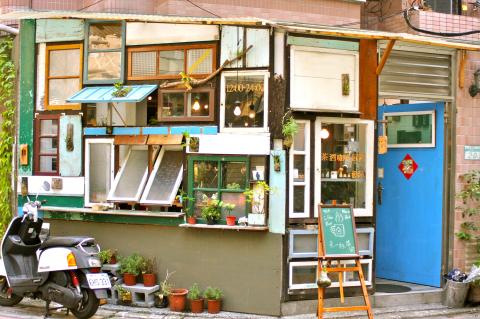
Photo: Catherine Shu, Taipei Times
(T.Loafer’s Chinese name means “small corner,” while the T in its English name stands for the tea served there and “loafer” is what Hsu hopes customers will become while at the cafe.)
Hsu originally wanted to open a hostel for young travelers, but he nixed that plan when he realized that operating costs would be too high. Instead, he focused on his work as a community developer in Sindian, where he works with studio Watch!Touch (手樸隨想), which creates accessories made with natural textiles and dyes.
Over the Lunar New Year, however, Hsu decided he was ready to try his hand at operating a cafe. He had spent his spare time wandering around Taipei City’s lanes and alleyways while studying real estate at university, and was familiar with the neighborhood near Lishui Street (麗水街) in the Shida area.
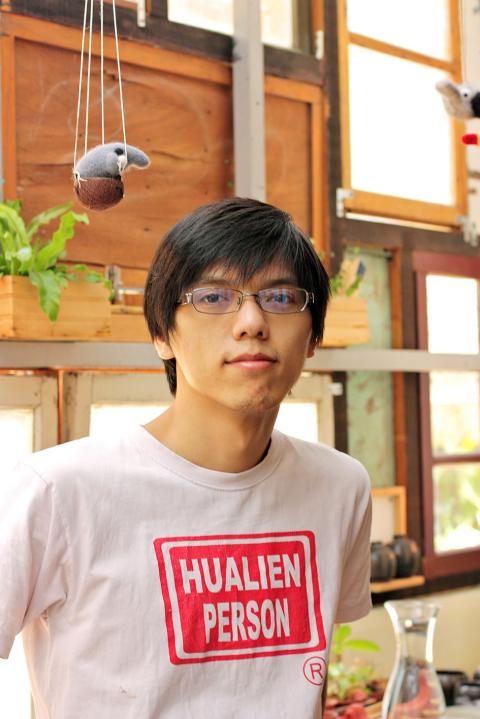
Photo: Catherine Shu, Taipei Times
“I found this space online and thought it was ideal,” Hsu says. “It’s a bit small, but the neighborhood, the environment and the lighting were all perfect.”
Though it is just blocks away from busy Jinshan South Road (金山南路), few cars and mopeds pass by T.Loafer. Instead, pedestrians wandering down the plant-lined alley provide subjects for people watching from T.Loafer’s wall of windows.
When Hsu rented the space, it had an all-white interior. With the help of friends, he completely redecorated the cafe over two months. He replaced the floorboards, added a small, recycled wood bar by the windows and painted the walls a homey shade of olive green. Instant film portraits, gifts from photographers who work in a darkroom downstairs, are taped to shelves.
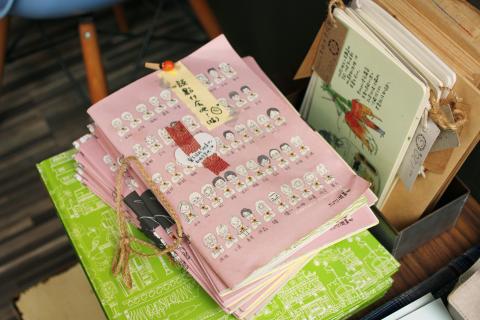
Photo: Catherine Shu, Taipei Times
A gallery of prints by artist Kuo I-kuan (郭以寬) of Chiuzen (沾手) hangs near the entrance, while shelves are lined with handmade items, such as brass and stone jewelry by Su Studio, wallets and scarves by Watch!Touch, hand-carved candles by Izy Home (家?形) and small houseplants in concrete planters by Goodmore.
Other goods include wooden bowls and clay coasters made by craftspeople in Yunlin County and Hsu’s hometown of Hualien.
Despite its popularity as a photo shoot location, Hsu hopes customers will feel free to treat T.Loafer as a second home.
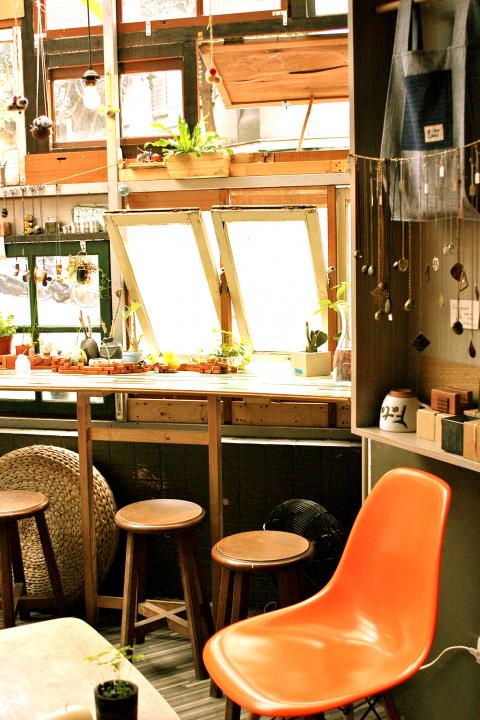
Photo: Catherine Shu, Taipei Times
“A lot of cafes now have very nice, professionally decorated interiors, but the trade-off is that people find it harder to relax in them. We thought why not decorate the cafe by ourselves, the way people decorate their own houses? We want T.Loafer to be a place where people can feel at ease and stay a little while.”
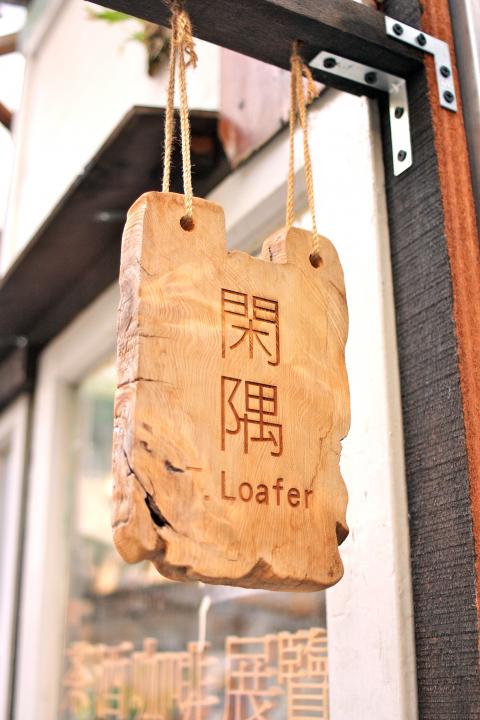
Photo: Catherine Shu, Taipei Times
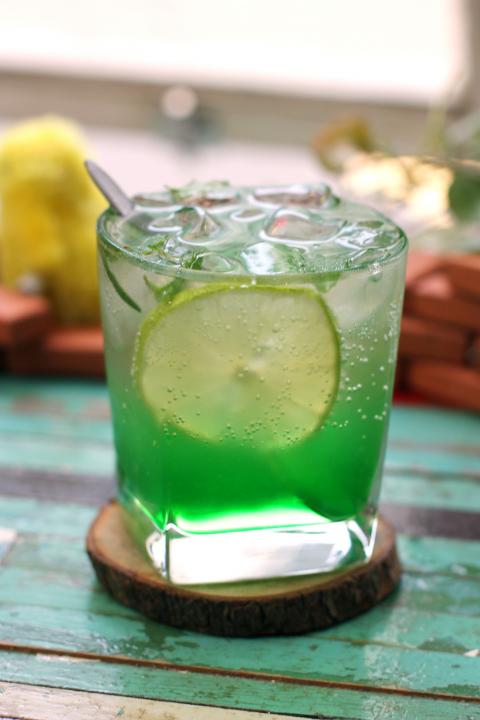
Photo: Catherine Shu, Taipei Times
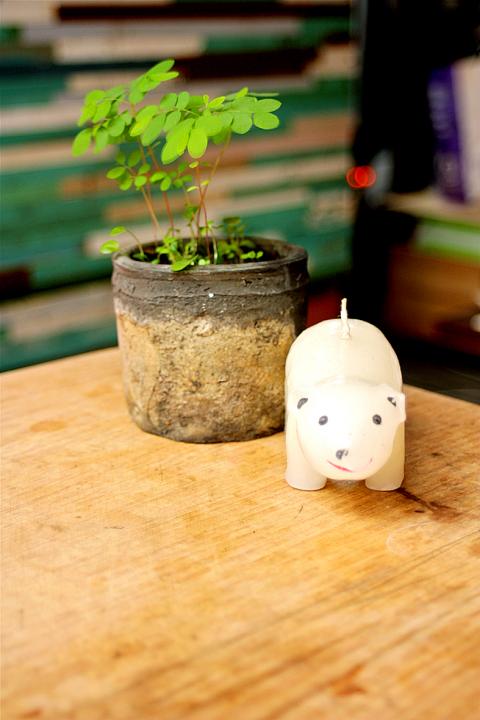
Photo: Catherine Shu, Taipei Times
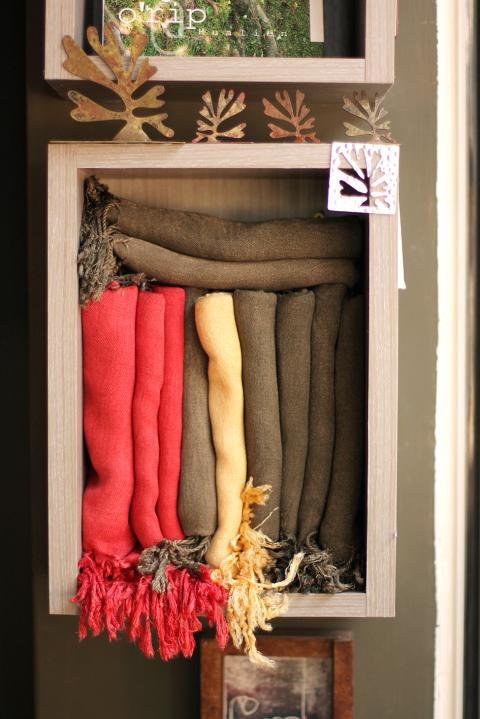
Photo: Catherine Shu, Taipei Times

Anyone who has been to Alishan (阿里山) is familiar with the railroad there: one line comes up from Chiayi City past the sacred tree site, while another line goes up to the sunrise viewing platform at Zhushan (祝山). Of course, as a center of logging operations for over 60 years, Alishan did have more rail lines in the past. Are any of these still around? Are they easily accessible? Are they worth visiting? The answer to all three of these questions is emphatically: Yes! One of these lines ran from Alishan all the way up to the base of Jade Mountain. Its

The entire saga involving the Taiwan People’s Party (TPP) and its Chairman Ko Wen-je (柯文哲) continues to produce plot twists at such a rapid pace that fiction publishers would throw it out for being ridiculously improbable. This past week was particularly bizarre, but surprisingly the press has almost entirely ignored a big story that could have serious national security implications and instead focused on a series of salacious bombshell allegations. Ko is currently being held incommunicado by prosecutors while several criminal investigations are ongoing on allegations of bribery and stealing campaign funds. This last week for reasons unknown Ko completely shaved

The only geopolitical certainty is that massive change is coming. Three macro trends are only just starting to accelerate, forming a very disruptive background to an already unsettled future. One is that technological transformations exponentially more consequential and rapid than anything prior are in their infancy, and will play out like several simultaneous industrial revolutions. ROBOT REVOLUTION It is still early days, but impacts are starting to be felt. Just yesterday, this line appeared in an article: “To meet demands at Foxconn, factory planners are building physical AI-powered robotic factories with Omniverse and NVIDIA AI.” In other words, they used AI

The rhythms of bustling, working-class Mumbai are brought to vivid life in All We Imagine as Light. The stunning narrative debut of filmmaker Payal Kapadia explores the lives of three women in the city whose existence is mostly transit and work. Even that isn’t always enough to get by and pay the rent. One of the women, a widow, recently retired from working her whole life at a city hospital, Parvaty (Chhaya Kadam), is even facing eviction. The other two, roommates and co-workers in the maternity ward are in different parts of life. Prabha (Kani Kusruti) has a husband from an